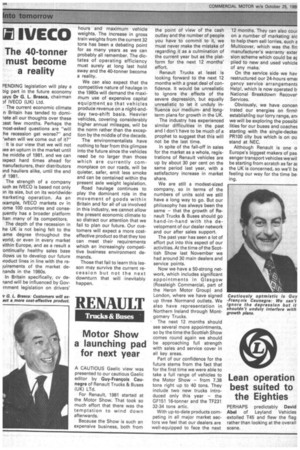The 40-tonner must become a reality
Page 96

If you've noticed an error in this article please click here to report it so we can fix it.
PENDING legislation will play a Dig part in the future economy lays Dr G. L. Brasca, chairman pf IVECO (UK) Ltd.
The current economic climate n Britain has tended to domi-late all our thoughts over these
ast few months. Perhaps the nost-asked questions are "will :he recession get worse?" and 'when will we come out of it?"
It is our view that we will not ;ee an upturn in the market until he middle of 1981, and we can xpect hard times ahead for nanufacturers, their distributors ;nd hauliers alike, until the end )f 1981.
The strength of a company ;uch as IVECO is based not only )n its size, but on its worldwidenarketing operation. As an
xarnple, IVECO markets cv in ;ome 100 countries and conseiuently has a broader platform han many of its competitors.
The depth of the recession in he UK is not being felt to the ame degree throughout the yorld, or even in every market yithin Europe, and as a result a ontinually healthy sales base flows us to develop our future Iroduct lines in line with the reluirements of the market denands in the 1980s.
In Britain specifically, cv de-land will be influenced by Govrnment legislation on drivers' hours and maximum vehicle weights. The increase in gross train weights from the current 32 tons has been a debating point for as many years as we can probably all remember. The dictates of operating efficiency must surely at long last hold sway and the 40-tonner become a reality.
We can also expect that the competitive nature of haulage in the 1980s will demand the maximum use of expensive capital equipment so that vehicles produce revenue on a night-andday two-shift basis. Heavier vehicles, covering considerably higher annual mileages, will be the norm rather than the exception by the middle of the decade.
The environmentalists have nothing to fear from this glimpse into the future since the vehicles need be no larger than those which are currently commonplace on our roads, will be quieter, safer, emit less smoke and can be contained within the present axle weight legislation.
Road haulage continues to play the dominant role in the movement of goods within Britain and for all of us involved in this industry, we cannot allow the present economic climate to so distract our attention that we fail to plan our future. Our customers will expect a more costeffective product so that they too can meet their requirements which an increasingly competitive business environment demands.
Those that fail to learn this lesson may survive the current recession but not the next downturn that will inevitably happen.
























































































































































